Welcome Cohort 11 MPS Students to the Labor and Global Workers’ Rights Program!
We are proud to welcome the eleventh cohort of the Master of Professional Studies (MPS) in Labor and Global Workers’ Rights (LGWR) program!
The program is part of the Global Labour University, a network of universities in six countries (Brazil, India, Germany, South Africa, United States, and Philippines), along with global union federations, national unions, and the International Labour Organization.
This academic year, the cohort will complete coursework on a broad range of labor issues around the informal and formal economies, history of work in the United States, gender and race at work, corporate research and campaigns, and international and comparative employment relations systems. During summer 2025, students will have the opportunity to participate in an internship with a labor organization and to complete a capstone research project.
The new cohort consists of nine international students who bring a wealth of experience promoting labor rights across a range of geographic, industrial, and organizational contexts.
Adelaide Denkyi (Ghana)
Kwan Liang (Hong Kong)
Leo Tang (Hong Kong)
Raja Vailankanni (India)
Pranav Pudasaini (Nepal)
Brian Gumiran (Philippines)
Nahwera Rachael (Uganda)
Lawrence Mashabela (South Africa)
Emilda Terere (Zimbabwe
Welcome one and all to the CGWR family!
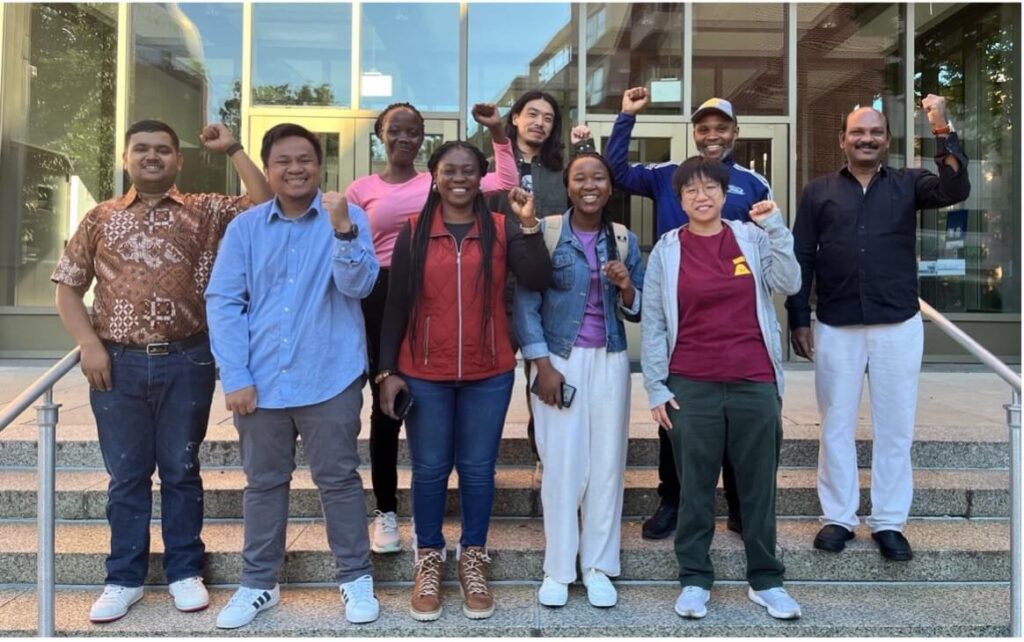
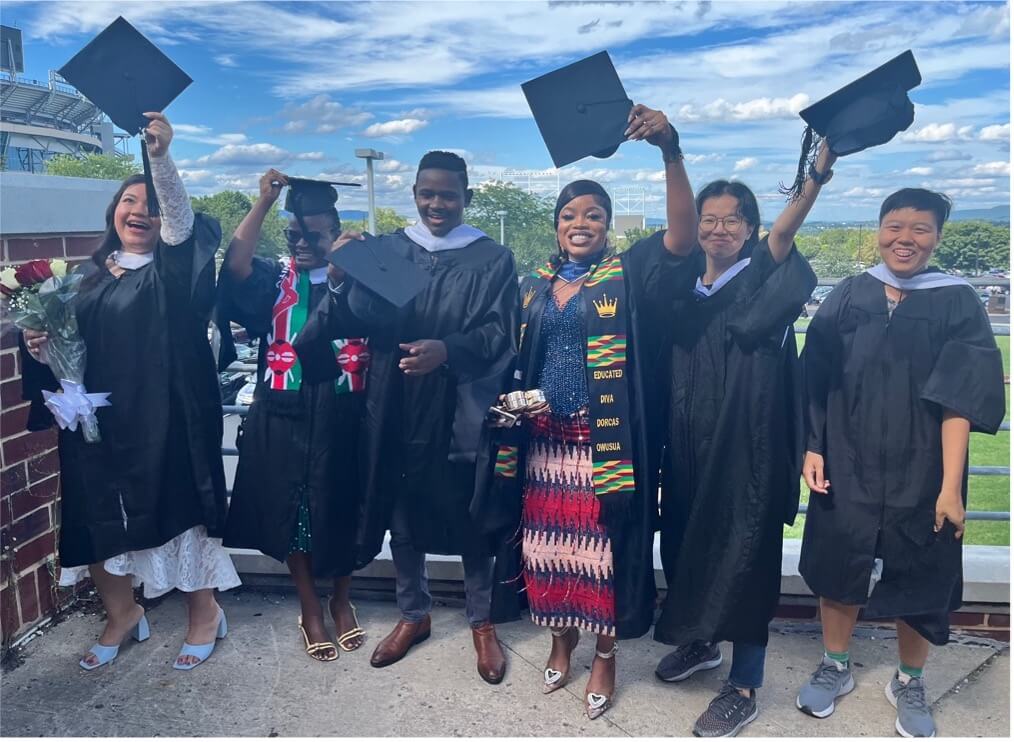
Congratulations to the 2023–2024 LGWR Cohort!
The faculty of the LGWR program and staff of the School of Labor and Employment Relations would like to extend our sincere congratulations to this year’s graduating class: Kayi Yiu (China), Haoju Lu (China), Abena Afriyie (Ghana), Dorcas Owusua (Ghana), Alejandra Flores (Honduras), Paul Macharia (Kenya), Mercy Nabwire (Kenya), and Muzammal Afzal (Kashmir/Pakistan/US).
Our Cohort 10 had the opportunity to learn from union organizers in the United States by participating in some labor activities such as the Service Employees International Union’s (SEIU) Leadership Assembly 2023 in Lancaster, and 2024 Labor Notes Conference in Chicago.
CGWR Speakers Series: Worker-Driven Co-Research
Professor Mark Anner, founding Director of the CGWR and the LGWR Program, conducted a workshop about the Worker-Driven Co-Research in Global Supply Chains Methodology. Mark is currently the dean and distinguished professor of the School of Management and Labor Relations at Rutgers University–New Brunswick.
This activity was part of the CGWR speakers’ series this fall Semester and took place at 112 Keller Building on Thursday, October 17. LGWR students participated in this academic activity and learned from three studies from Latin America: Guatemala, Honduras and Mexico.
The workshop had specific exercises on strategic corporate research for an effective collective bargaining process. The use of some digital platforms such as Yahoo Finance or public information such as the 10-K from publicly-traded companies was fundamental to understand how information increases workers power.
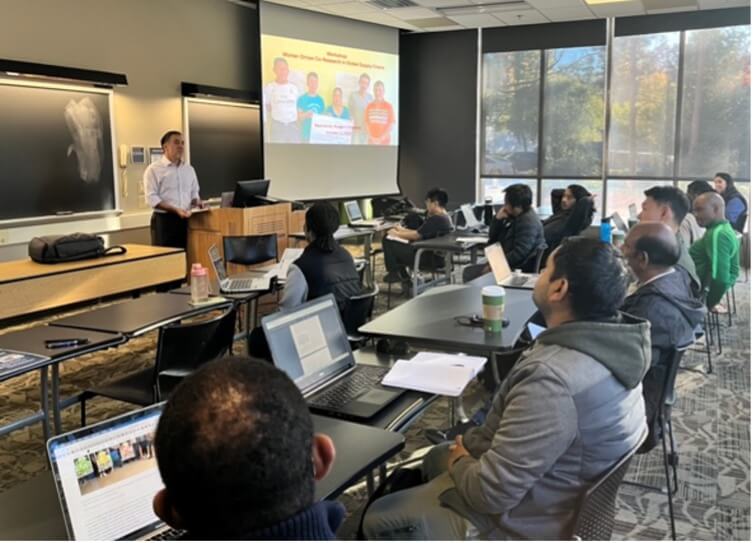
New LGWR Adjunct Professors: Jaeung Kim and Connor Lewis
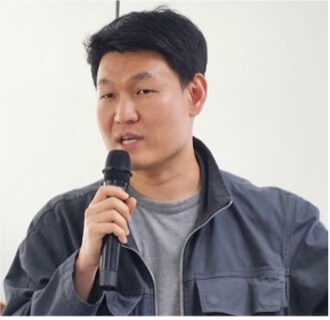
Jaeung Kim earned a doctoral degree in lifelong learning and adult education, with a dual degree in comparative and international education from Penn State. His dissertation focuses on the advancement of workers’ education in South Korea from 1980 to the present. His research areas include labor education, state-civil society relations, social movements, and ethnography. As a lead author, he has published articles on labor education and the revitalization of teachers’ unions in the International Journal of Lifelong Education and Globalisation, Societies and Education. Jaeung is teaching international and comparative employment relations.

Connor Lewis earned a doctoral degree in history at the University of Missouri. He is a region advocacy coordinator for the Pennsylvania State Education Association (PSEA), and president of Seven Mountains AFL-CIO. Connor is teaching research methods for labor and global workers’ rights.
Welcome Jaeung and Connor to the Labor and Employment Relations School!
Global Labour University Conference 2024, India
The annual GLU Conference “Globalization and the transition to an egalitarian world: Resistance and alternatives” took place at the Jawaharlal Nehru University (JNU) in New Delhi (India) from September 25 to 27, 2024.
The inaugural lecture titled “From Neoliberal Globalisation to Authoritarian Geopolitics? Challenges for the Global Labour Movement” was given by Professor Christoph Scherrer, University of Kassel (Germany). There were fifteen parallel sessions on issues such as labor responses against the attraction of right-wing authoritarianism, gig economy and platform work, labor regimes and policies, and global value systems.
The valedictory lecture was given by Elena Gerasimova, a Labour Law and Labour Standards Specialist from the International Labour Organization.
The annual GLU conferences take place at each GLU campus on a rotating basis and are an opportunity for members of the network to present their research, discuss new ideas and strengthen the network.
Our LGWR Alum Margaret Marfo (Ghana) and Gonca Acaray (Turkey) made a presentation about gender inequality in trade union leadership, and the need of challenging the organization of work with a radically caring transformation (See a summary of their presentation in the GLU conference below).
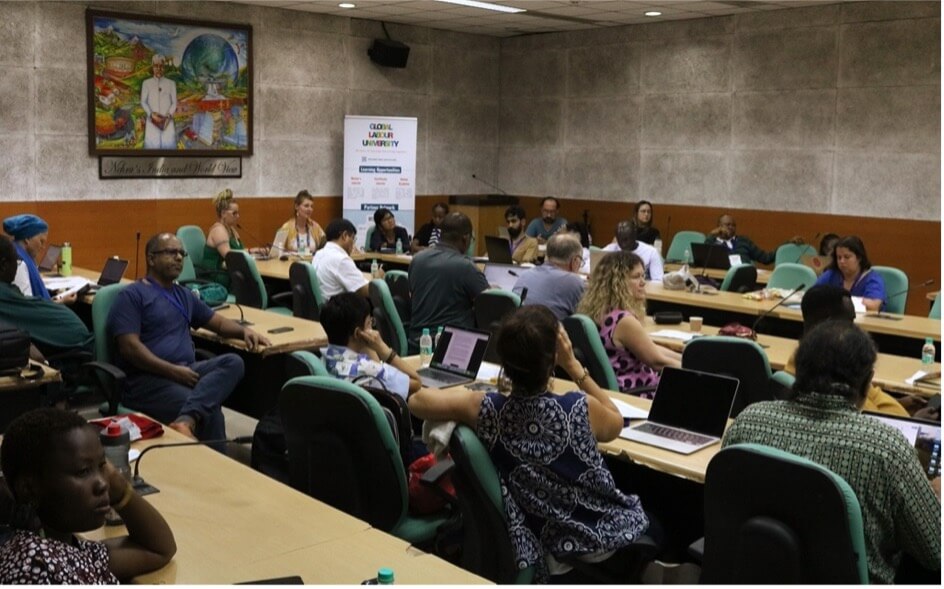
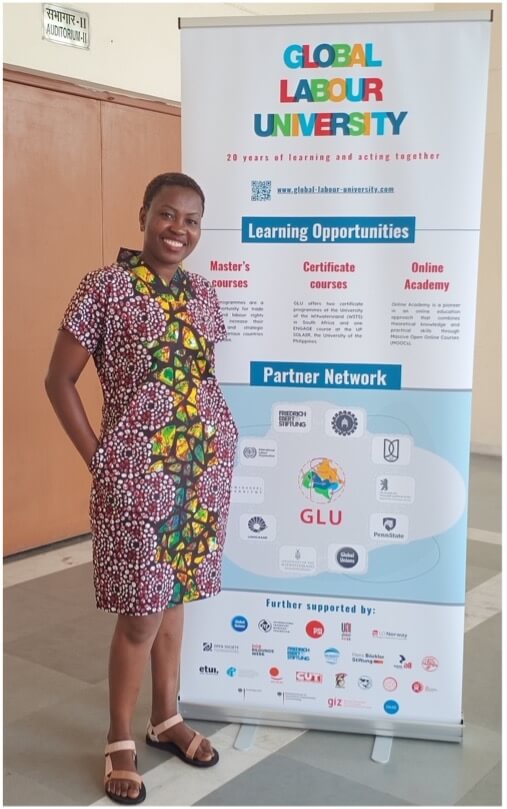
Gender Inequality in Trade Union Leadership: Women’s Choice or Institutionalized Barriers
Despite the growing engagement in the labor movement there is still under representation of women in union leadership roles, specially at the strategic decision-making level. One the outcomes is that the content of collective agreements remains male-oriented. Some structural barriers such as labor market segmentation, the burden of unpaid work for women, gender discrimination at the workplace need to be addressed by the trade union movement. Acknowledging gender imbalances within the labor movement and seeking to implement clear corrective measures to achieve gender equality are steps in the right direction.
The struggle for equality, social justice, and recognition for women has evolved for centuries. Women’s growing engagement in labor cannot be overemphasized. Nonetheless, few women are found in union leadership roles at all levels, notably at the strategic decision-making roles. Few women participate in collective bargaining; hence, the content of collective agreements remain male-oriented.
In recent years, there have been many works on diversity, gender inclusion, and equal opportunity for women and men in politics, which accounts for the efforts made by Trade Unions to incorporate women into their leadership structures. The progress may be described as structural changes in trade unions that acknowledge gender imbalances and seek to implement clear corrective measures to achieve gender equality.
However, it is a narrative of one stride ahead, two steps back, or two steps forward, one step back. I argue that Trades Union solutions have not been fundamental, but structural, which has further created barriers, to women climbing the leadership ladder. Some of these barriers include gender factors that frame union and work traditions (Labour market segmentation), multifunctional role of women (balancing domestic life, and work/union responsibilities), masculinization of unions (history of trades union), funding/power imbalance between women’s wings and mainstream union governing structure, perceptions about female capabilities and name-calling (stigmatization). Until these fundamental challenges are addressed, we will continue to witness less women in strategic leadership roles due to such institutionalized barriers.
Towards a Global Labor Agenda Framework: Reconsidering What We Talk about When We Talk about Work
Most struggles and theoretical discussions have focused on the conditions of work and ways to improve them. However, if we do not challenge the organization of work with a radically caring transformation, the issues surrounding work will persist. A possible first step toward this transformation is to reconsider what we talk about when we talk about work.
This presentation offers seven areas for reflection on our conception of work and the labor agenda: how to go beyond wages and monetary benefits; how to claim control and autonomy in the labor process; how to reframe human development and self-actualization; how to redefine prestige, meaning, and purpose in work; how to consider production for use value instead of exchange value; how to reclaim time and space at work and beyond; and how to center collectivism and solidarity as a guiding principle. It calls for a new manifesto for work—transnational, intersectional, (re)humanizing, and decolonizing—taking into account the meanings, values, and imaginations of workers.
Achieving this transformation requires integrating labor regime and social reproduction analysis to address local, regional, and global dynamics, as well as wider social institutions and processes. This approach calls for greater collaboration with social movements, community organizations, and social justice initiatives; a more balanced focus on immediate survival needs alongside long-term agendas for the working class; and increased praxis along the lines of research, education, and action towards a broader social change.


Last Academic Year of the LGWR Program at Penn State
The School of Labor and Employment Relations (LER) is offering the Master of Professional Studies program in Labor and Global Workers’ Rights (LGWR) for the final time in the 2024-2025 academic year.
The LGWR program, tailor-made for labor activists, was established in 2013 by Professor Mark Anner and began receiving students in 2014. Due to the dedication of Professor Anner and other School of LER faculty, over the last decade, the program admitted over sixty students from all five continents, over half being female or with non-binary gender identities.
Through the LGWR program, our students and alumni have obtained intellectual and practical movement resources and become part of global labor movement networks. LGWR students have actively promoted awareness and action around workers’ rights both locally and globally. The program’s alumni continue to devote themselves to the global labor movement.
Although the program will be closing, the School of LER’s Center for Global Workers’ Rights, which has worked closely with the LGWR program, continues to serve as a reference point for research on local, national, and global labor issues.
We extend our heartfelt thanks to the partners of the LGWR program, including AFL-CIO, the Global Labour University (GLU), and the Global Union Federations network, as well as the College of the Liberal Arts, and the School of LER faculty, staff, and alumni, who have all made invaluable contributions to the program.
This publication is available in alternative media on request. Penn State is an equal opportunity, affirmative action employer, and is committed to providing employment opportunities to all qualified applicants without regard to race, color, religion, age, sex, sexual orientation, gender identity, national origin, disability or protected veteran status. UBR CLA 24-1202